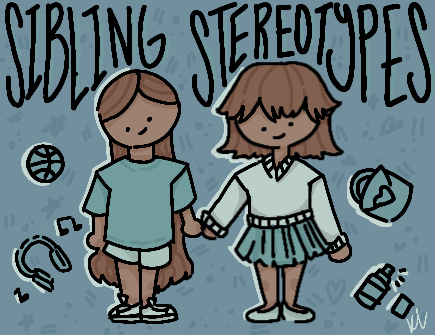Birth order notions inhibit uniqueness

Siblings are often put into categories based on birth order or age. The Sidekick staff writer Sreehitha Moravaneni goes into detail on how in regards to sibling dynamics, these stereotypes aren’t one size fits all.
April 11, 2023
“You’re more spoiled aren’t you? You know, because you’re younger.”
When looking at my sister Anoohya and I, people often assume that we are vastly different, both physically and mentally. They assume specific character differences between us, which are often just stereotypes based on our ages and do not depict the true nature of our dynamics and personalities.
For example, people will claim that the younger sibling will make mistakes and not learn from them, or that they are also spoiled and have it easier while the older sibling is more likely to know better.
This isn’t the case for everyone, as siblings are not a one size-fits-all dynamic. Most siblings are a product of how they were raised, not so much of how they innately are expected to act and behave.
A common misconception about siblings is that the younger sibling is more likely to get away with making mistakes over their older sibling. This statement is far from the truth.
My experience as a younger sibling is vastly different from what stereotypes make me out to be. I certainly do not make any less mistakes than my older sister, if anything, I’ve probably made more.
For example, when I started driving.
My sister, who is three and a half years older, was allowed to drive much earlier in her life than I was. It took me two more years, until I was nearly 18 and my parents believed I had reached a maturity level where I was competent enough to drive. I was conditioned to prove myself in order to accomplish things that were handed to my older sister.
I had to prove myself to earn any of my accolades. I was constantly tested on my abilities, and had to reach a certain point where my parents felt comfortable sending me on my own way. In this way, I retaliate against the stereotype of the spoiled younger sibling. Proving myself to earn something is vastly different from getting it handed to myself.
In the media, we see siblings portrayed in different lights in terms of their intelligence. Many characters from major television streamers growing up, such as Disney Channel, have a tendency of portraying older siblings as unintelligent, middle children as the “normal” ones, and the youngest siblings as the geeky, odd ones.
The Disney sitcom, “Good Luck Charlie”, for example, is about a family and their navigation of the arrival of a new baby. Son, PJ, is the oldest sibling, who is known for having the most childish personality of the three. Teddy is the middle child, who is shown as a rational and mature thinker. Gabriel, is the youngest of the three, before the arrival of their younger sister, who is an outcast troublemaker but tries hard to fit into groups at school.
This representation of siblings on broadcast television only provides implications for future generations.
Stereotypes set future generations up to form a preconceived idea of what a sibling dynamic should look like and how they should act. A way to get around this problem is to prevent people from publicizing stereotypes on television media which tends to have a broad and potentially impressionable audience, and instead represent different situations and bring light to unique relationships.
We need to stop normalizing generalized scenarios and attributing them to a sibling stereotype. Instead, we should embrace the uniqueness of every dynamic and break out of the mindset of how a person’s behavior “fits” based on their role as an older or younger sibling.
The severity of those stereotypes also differs from relationship to relationship; not everyone hates their siblings, and not everyone loves their siblings. Some have a surface level relationship with their siblings and that is fine.
Follow Sreehitha (@sreehithaMorav) and @CHSCampusNews and on Twitter.









